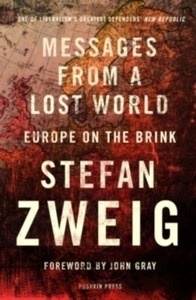Messages from a Lost World : Europe on the Brink

Editorial Pushkin Press
Fecha de edición marzo 2017 · Edición nº 1
Idioma inglés
EAN 9781782272298
224 páginas
Libro
encuadernado en tapa blanda
Resumen del libro
As Europe faced its darkest days, Stefan Zweig was a passionate voice for tolerance, peace and a world without borders. In these moving, ardent essays, speeches and articles, composed before and during the Second World War, one of the twentieth century's greatest writers mounts a defence of European unity against terror and brutality. These haunting lost messages, all appearing in English for the first time and some newly discovered, distil Zweig's courage, belief and richness of learning to give the essence of a writer; a spiritual will and testament to stand alongside his memoir, The World of Yesterday.
Brief and yet intense, they are a tragic reminder of a world lost to the 'bloody vortex of history', but also a powerful statement of one man's belief in the creative imagination and the potential of humanity, with a resounding relevance today. "At a time of monetary crisis and political disorder, of mounting border controls and barbed-wire fences...Zweig's celebration of the brotherhood of peoples reminds us that there is another way" The Nation "One of liberalism's greatest defenders" New Republic "Zweig's impassioned pursuit of personal freedom seems more relevant than ever" Newsweek "These essays, few in number but rich in content, reveal the essence of Zweig's thought. ..Messages from a Lost World is ably translated from German into English for an American readership by Will Stone, making it an extraordinary and highly recommended addition to community and academic library collections" Midwest Book Review "In pieces from the 1920s and early 30s, Zweig takes it as a moral imperative to champion the cause of peace by reminding his readers and listeners that humanity could no longer afford the sort of belligerent nationalism that had led them into the Great War" Inside Higher Ed "While it is disheartening to read these pieces today, knowing how Zweig's life ended, it is inspiring to see that they have been published.
However defeated Zweig might appear to contemporary readers, however aloof or naive, his idea of the European soul is still worth defending" Northwest Review of Books Stefan Zweig was born in 1881 in Vienna, a member of a wealthy Austrian-Jewish family. He studied in Berlin and Vienna and was first known as a translator and later as a biographer. Zweig travelled widely, living in Salzburg between the wars, and enjoying literary fame.
His stories and novellas were collected in 1934. In the same year, with the rise of Nazism, he briefly moved to London, taking British citizenship. After a short period in New York, he settled in Brazil.
It was here that he completed his acclaimed memoir The World of Yesterday, a lament for the golden age of a Europe destroyed by two world wars. The articles and speeches in Messages from a Lost World were written as Zweig, a pacifist and internationalist, witnessed this destruction and warned of the threat to his beloved Europe. On 23 February 1942, Zweig and his second wife Lotte were found dead, following an apparent double suicide.
Much of his work is available from Pushkin Press.
Biografía del autor
Stefan Zweig (Viena, 1881 - Petrópolis, 1942) fue sin duda una de las figuras intelectuales más destacadas del Viena brillante del primer tercio del siglo XX.








